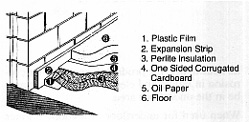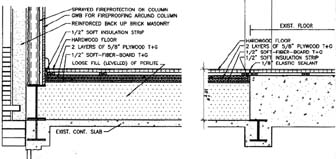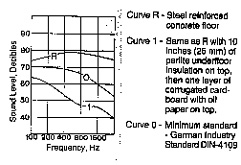What is Perlite?
Perlite is not a trade name but a generic term for naturally occurring siliceous volcanic rock. The distinguishing feature which sets perlite apart from other volcanic glasses is that when heated to a suitable point in its softening range, it expands four to twenty times its original volume.
This expansion is due to the presence of two to six percent combined water in the crude perlite rock. When quickly heated to above 1600° F (8700 C) the crude rock pops in a manner similar to popcorn as the combined water vaporizes and creates countless tiny bubbles in the heat softened glassy particles. It is these tiny glass-sealed bubbles which account for the excellent insulating properties and lightweight of expanded perlite.
Expanded perlite can be manufactured to weigh from 2 lb/ft3 (32 kg/m3) to 15 lb/ft3 (240 kg/m3) making it especially suitable for use in insulation applications. Perlite is used in the manufacture of lightweight perlite concrete, insulating board, insulating plasters, cryogenic insulation, masonry wall insulation and as underfloor insulation.
Why Perlite Insulation?
Perlite underfloor insulation is an inorganic product that does not rot, support combustion nor provide a habitat for rodents. Because of its neutral pH, the product does not foster corrosion in piping and electrical wiring that may be in the underfloor area.
When used for underfloor insulation, a water repellent, dust suppressed perlite specially produced for this application is used.
Perlite Underfloor Insulation Specifications
Either regular perlite insulation, silicone-treated perlite, or dust suppressed perlite can be used for underfloor insulation. These different types of perlite can be produced in accordance with ASTM C549. Other specifications are outlined below.
| Density | 4.5 to 6.25 lb/ft 3 (70-100 kg/m3 |
| Sieve Analysis (U.S. Standard) | 10-20 % plus 16 mesh 1.18 mm) 90% plus 100 mesh 0.150 mm) |
| Thermal Conductivity (Varies with Density) | 0.27-0.33 BTU.in/h.ft2 .F0 0.039-0.047 W/m .K |
Underfloor Applications
Perlite underfloor insulation may be used under floating concrete floors, asphalt floors and floating board floors. It is especially useful when used to level floors and greatly reduces sound transmission from floor to floor, from floors to walls and from underfloor piping systems.
Floating Floors
Perlite underfloor insulation is most frequently used under floating concrete floors. In this application, perlite insulation is poured on the original floor surface, screeded to proper depth, covered with corrugated cardboard or lightweight boards, and a layer of oil paper. Oil paper must be used if a concrete floating floor is to be poured. A plastic film is used beneath the perlite to prevent seepage of material between cracks in floors and walls. Poured concrete floors, asphalt floors or wood floors can be laid over the insulation in a conventional manner.

This system is particularly useful when underfloor heating is employed as the insulation is dimensionally stable under varying temperatures and is not combustible. Perlite underfloor insulation as thick as 12 inches (30 cm) has been applied, but 2-4 inches (6-10 cm) is the normal. Underfloor insulation over 4 inches (10 cm) should be compacted. A unique feature of perlite insulation is that particles will interlock when pressed together and settling or volume changes will not take place.
Levelling of Floors
A special property of perlite is its ability to flow around any roughness, unevenness or exposed installations on the base floor. This enables the easy and rapid installation of level floors. In addition, because perlite underfloor insulation can be made to resist water penetration, it will not absorb or hold water permanently should there be a plumbing leak. This characteristic of perlite underfloor insulation will limit damage to a local area. As perlite is inorganic with a neutral pH, it will not corrode piping or electrical or communications conduits beneath the floor.

Sound Insulation
An area of increasing importance today is sound insulation. In construction there are three concerns: low sound transmission in construction components, low transmission between floors and walls and low transmission of sound from footsteps. Perlite underfloor insulation performs in much the same manner as multiwall systems with bulk insulation to achieve reductions in sound transmission.
With perlite underfloor insulation systems, sound transmission from floors to walls is reduced by using expansion strips at the intersection of floors and walls. Sound transmission from plumbing systems is also reduced when piping is surrounded by perlite insulation within the floor.

For more information about these uses of perlite and vermiculite, please call or contact us at:
The Schundler Company
10 Central Street
Nahant, MA 01908
(ph)732-287-2244 (fax) 732-287-4185
www.schundler.com
email: info@schundler.com
Back to Industrial Products